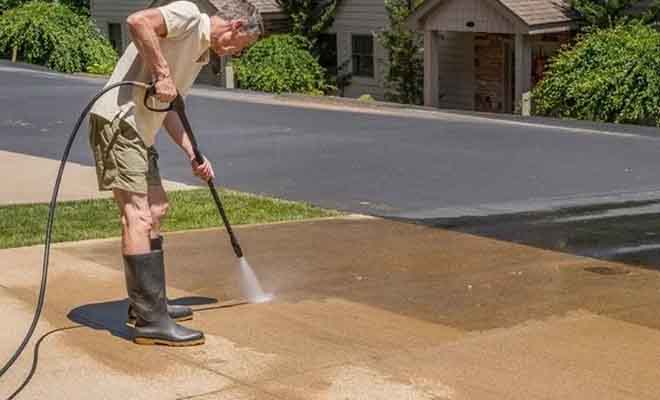Your driveway can be way more than just a place to park your car - it can actually increase your curb appeal! That is, unless the driveway in question has accumulated dirt, grime, oil stains, and organic growth like mildew. This not only diminishes your driveway’s appearance, it can also potentially cause damage.
This is where the power of pressure washing or power washing comes in. Regularly pressure washing your concrete driveway, brick driveway, or even pavers not only restores it to cleanliness but also prolongs its lifespan. It might not be the first thing you think of when trying to make your property look great, but driveway cleaning is an essential part of home maintenance for all homeowners!
When you fail to clean your driveway’s surface, it can lead to a buildup of substances that are not attractive, but also potentially damaging. Moss, algae, and mildew can grow in damp, shaded areas, leading to slippery surfaces and potential cracks. Oil and grease stains from vehicles can actually penetrate the surface - causing stubborn stains and weakening the material.
All you have to do to prevent those scenarios is remember to regularly pressure wash your driveway! High-pressure water from a pressure washer effectively removes these stains and other grime, preventing long-term damage and maintaining the structural integrity of your driveway.
To achieve a spotless driveway, you'll need the right tools, cleaning solution, and a systematic approach. Let’s go over the tools and equipment needed to do this job correctly.
For concrete surface, use a heavy-duty alkaline degreaser designed to remove oil, grease stains, and grime. For asphalt, opt for a milder detergent to avoid damaging the surface. Always check the manufacturer's recommendations for specific surface types.
There are also some environmentally friendly options! Look for biodegradable and phosphate-free detergents to minimize environmental impact. Some people also use diluted bleach solutions, but this must be done with extreme care. Using these cleaning solutions and detergents may require a separate sprayer for pre-treating hard to remove stains.
Pressure washing your driveway can be a straightforward DIY project for homeowners with the time and equipment. Let’s go over the process step by step!



There is a method for cleaning just about any stubborn stain you can find on a driveway surface! If it is an oil stain, simply apply a degreaser or a specialized oil stain remover before pressure washing. For very old stains, you may need to repeat the process more than once.
For rust, use a rust remover or a solution of oxalic acid to loosen rust stains before pressure washing. Got tire marks? A strong alkaline detergent or a tire mark remover can help break down these stubborn stains. A pressure washer surface cleaner is very helpful for this as well!
If the stain is still refusing to go, try using a higher pressure setting. In extreme cases, a rotary nozzle could be used, but make sure to be very careful or you could damage the surface.
Here are some of the common pitfalls regarding pressure washing your driveway surface. Each one is avoidable if you follow this advice.

For large driveways or difficult stains, you may want to consider hiring professional pressure washing or pressure washing services. Professionals have the experience, equipment, and expertise to handle the more difficult pressure washing job tasks with ease.
Some factors that can affect how often you should pressure wash your driveway include weather, traffic, and location. Weather conditions, such as excessive rain or snow, can mean more dirt and grime on your driveway surface. As you might expect, driveways that see a lot of traffic need more frequent cleaning. Location is also a factor. For example, driveways under trees with falling leaves and other debris will need more regular cleaning. Usually, once or twice a year is enough to maintain your driveway.
Pressure washing comes with a lot of benefits, including saving you money. Regular pressure cleaning prevents the buildup of damaging substances, extending the lifespan of your driveway and avoiding costly repairs or replacements. Other benefits include:
Yes, with the right equipment and techniques, you can definitely pressure wash concrete yourself.
Using excessive pressure or improper techniques can damage your driveway. Always test the pressure on a small area first and use the right cleaning solutions for your driveway surface.
Apply a degreaser or a specialized oil stain remover before pressure washing. For stubborn stains, repeat the process!
 Driveway Guides
Driveway Guides Driveway Guides
Driveway Guides Driveway Guides
Driveway Guides